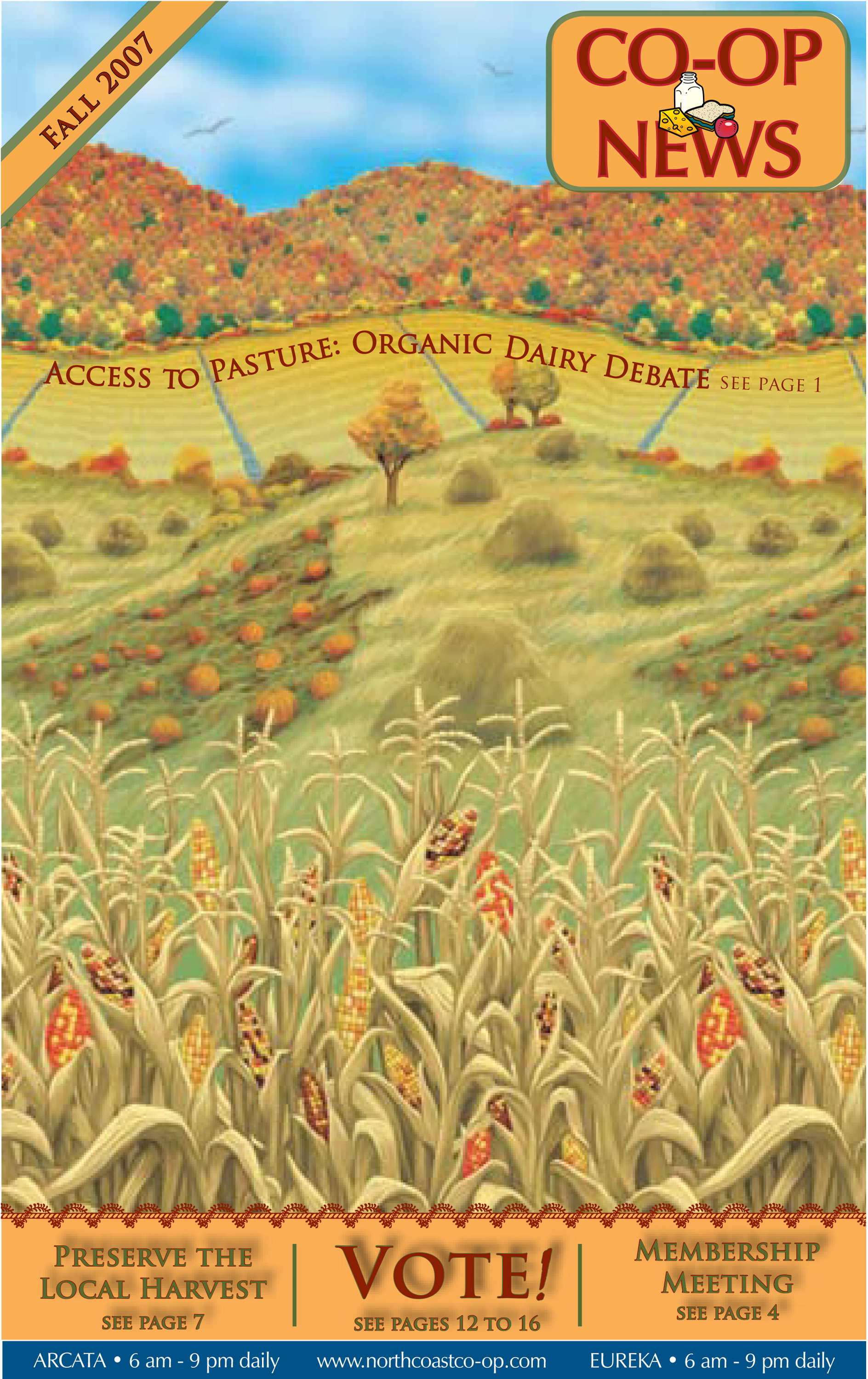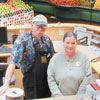
Co-op News Archive | Summer Quarterly 2019
Buy Local or Buy Organic? Top 10 Reasons to Buy Both
In the spring edition of Co-op News, we asked members what was more important to them – organic or local produce? We’ll post your responses in the Fall edition. Meanwhile, this article, originally appearing in the Fall 2007 edition of Co-op News, answers the question with ‘Both’!
From the Co-op News Archive, Fall 2007
 When you take a step outside the Humboldt, or even the California bubble, you will find that we are spoiled with an array of food. Produce, meat and poultry pump through our state by the tons filling the aisles of grocery stores all vying for the concerned consumer’s dollar.
When you take a step outside the Humboldt, or even the California bubble, you will find that we are spoiled with an array of food. Produce, meat and poultry pump through our state by the tons filling the aisles of grocery stores all vying for the concerned consumer’s dollar.
In the world of organics this presents a quandary for consumers. In many places people don’t have choice between organic apples, local apples and apples imported from Washington—yet in our bubble we often do. So what reason or logic does one employ when faced with the decision of whether to buy conventional fruit from Humboldt or organic fruit trucked in from miles away. Whichever your preference, for those of us living in Humboldt County there are benefits to both organic and local products; both serve a vision of environmental responsibility.
Buying your food at the Co-op reveals two of the many reasons people choose the food they do. Supporting local farmers and supporting organic agriculture are the cornerstones around which our Co-op is built. It is important to consider that buying locally produced food can be just as beneficial as purchasing organic food. With a vision for sustainable living—one might stop to think about how far an organic apple traveled to get to our store versus locally produced Neukom’s apples.
Here are our top ten reasons to buy both local and organic:
- Better Taste Food grown in your own community was probably picked within the past 24 hours. It’s crisp, sweet and loaded with flavor. Produce flown or trucked into town is much older. Several studies have shown in lab taste trials that organic berries were consistently judged as sweeter.
- Peace of Mind Locally grown food, purchased soon after harvest, retains its nutrients. And while certified organic is the only defacto seal of reassurance against genetically modified food, fertilizers and other toxins, our local farmers are committed to a level of nutritional integrity.
- Preserves Genetic Diversity In the modern industrial agriculture system, varieties are chosen for their ability to ripen simultaneously and withstand harvesting equipment; for a tough skin that can survive packing and shipping; and for an ability to have a long shelf life in the store. Only a handful of hybrid varieties of fruits and vegetables meet these rigorous demands, so there is little genetic diversity in the plants grown. Local and organic farms, in contrast, grow a huge number of varieties to provide a long season of harvest, an array of eye-catching colors and the best flavors. Many varieties are heirlooms, passed down from generation to generation, because they taste good. These old varieties contain genetic material from hundreds of years.
- Respects the Land Whether it is local fruit, imported coffee or artisan cheese, organic can demonstrate a reverence for the land and its people. No matter the zip code, organic has proven to use less energy than conventional agriculture, is beneficial to soil, water and local habitat, and is safer for the people who harvest our food.
- Supports Local Farm Families Local farmers who sell direct to consumers cut out the middleman and get full retail prices for their food - which means farm families can afford to stay on the farm, doing the work they love.
- Builds Community When you buy organics or direct from a local farmer, you are re-establishing a time-honored connection between the eater and the grower. Relationships built on trust and understanding help to build community both socially and economically.
- Preserves Open Space As the value of direct-marketed and certified organic fruits and vegetables increases, selling farmland for development becomes less likely. We appreciate the lush fields of crops, the meadows full of wildflower, the picturesque red barns here in the Humboldt bubble, but that landscape will survive only as long as farms are financially viable. When you buy locally grown food certified organic or not, you are doing something proactive to help preserve the agricultural landscape.
- Keeps Taxes in Check Farms contribute more in taxes than they require in services, whereas suburban development costs more than it generates in taxes, according to several studies. On average, for every $1 in revenue raised by residential development, government must spend $1.17 on services, thus requiring higher taxes of all taxpayers. For each dollar of revenue raised by farm, forest, or open space, governments spend 34-cents on services.
- Supports a Clean Environment A well-managed family farm is a place where the resources of fertile soil and clean water are valued. Good stewards of the land prevent erosion and replace nutrients used by their crops. According to some estimates, farmers who practice conservation tillage could sequester 12 to 14 percent of the carbon emitted by vehicles and industry. In addition, the habitat of a farm-the patchwork of fields, meadows, woods, ponds and buildings-is the perfect environment for many beloved species of wildlife, including bluebirds, killdeer, herons, bats and rabbits.
- It’s About the Future By supporting local and organic farmers today, you can help ensure that there will be farms in your community tomorrow, and that future generations will have access to nourishing, flavorful and abundant food.




